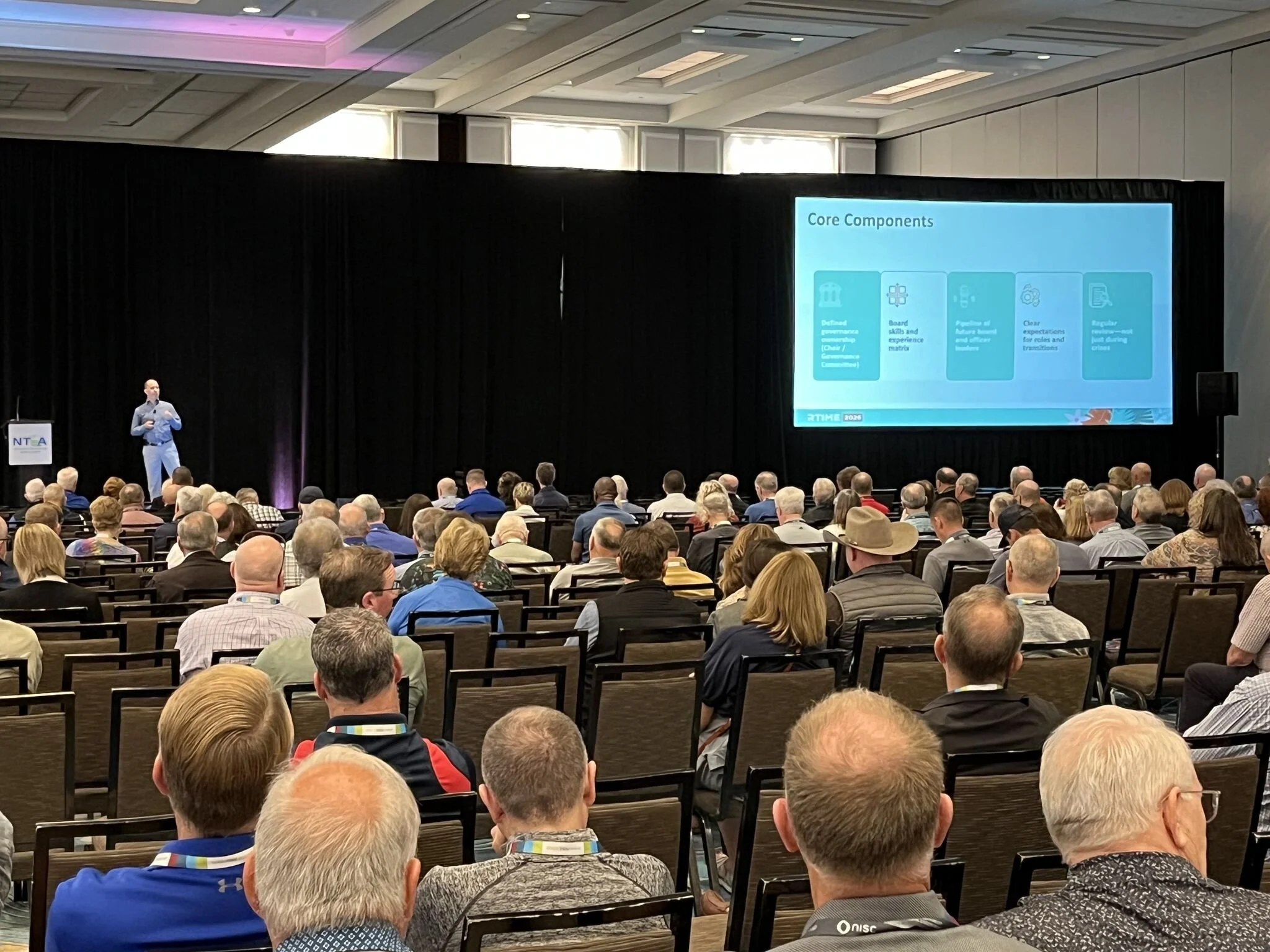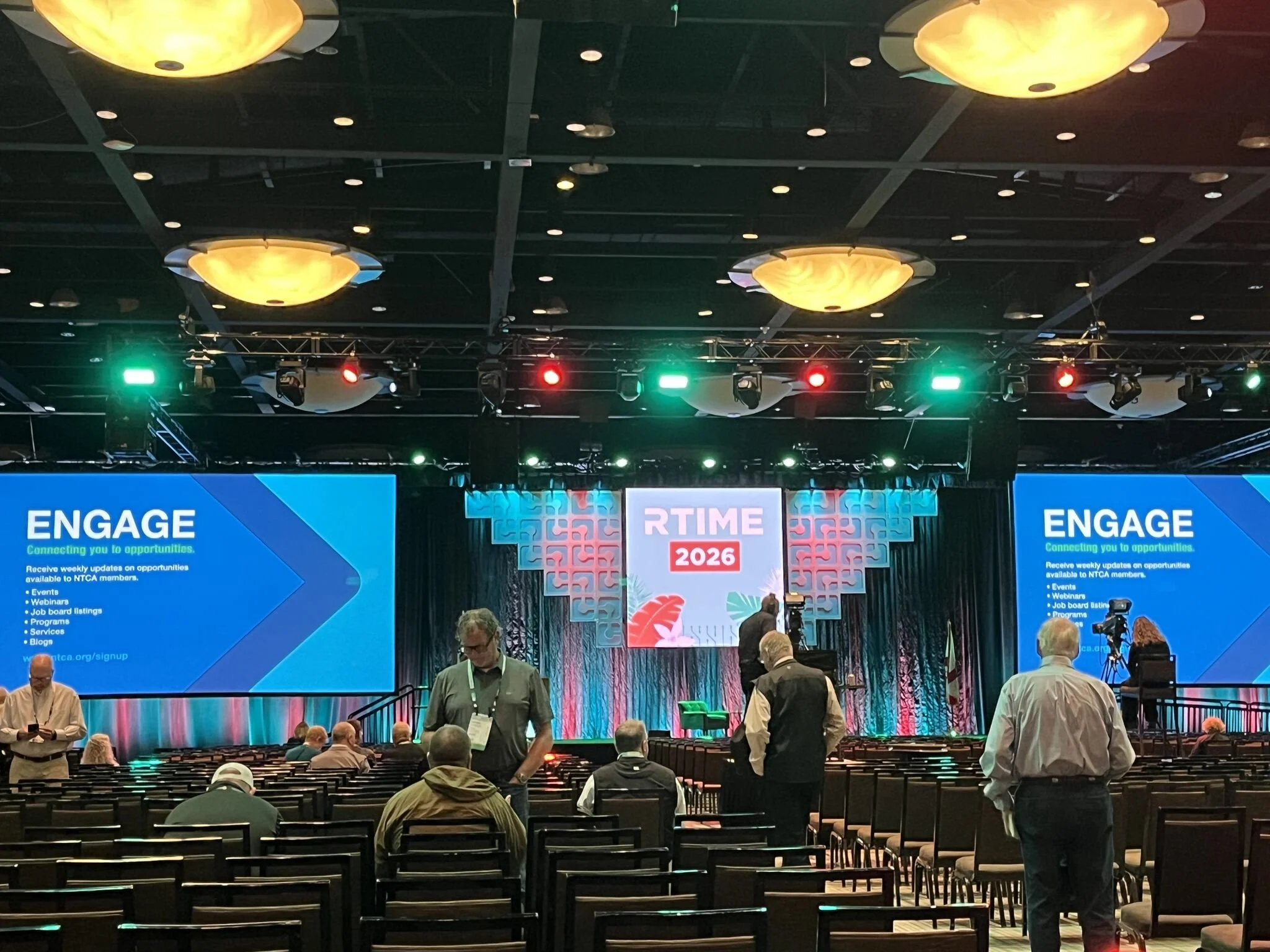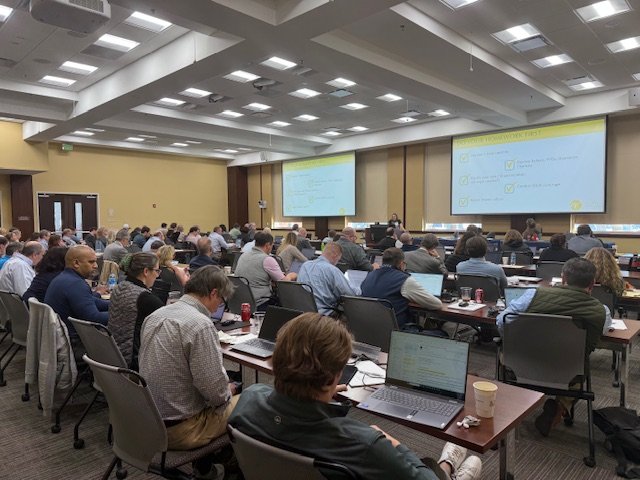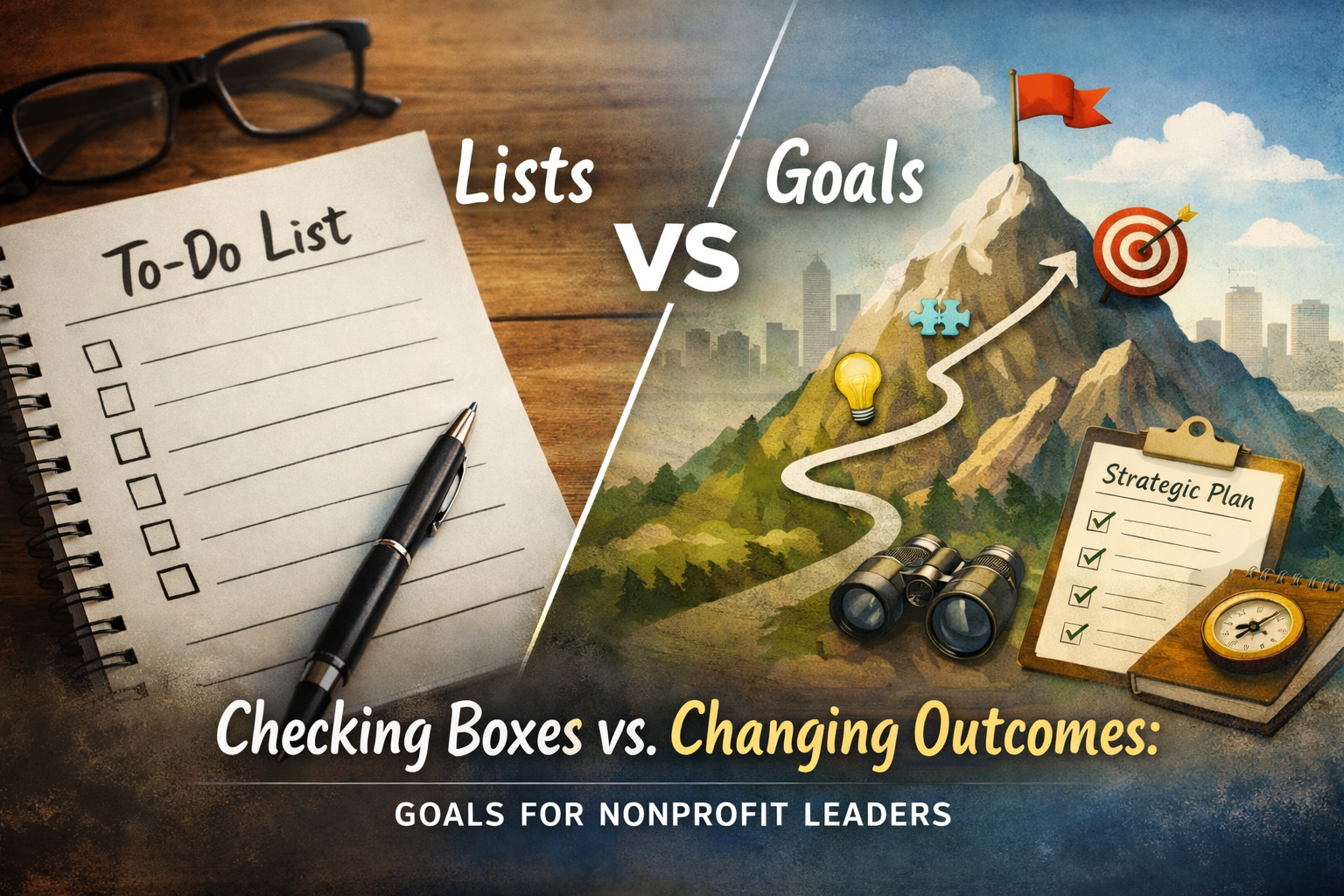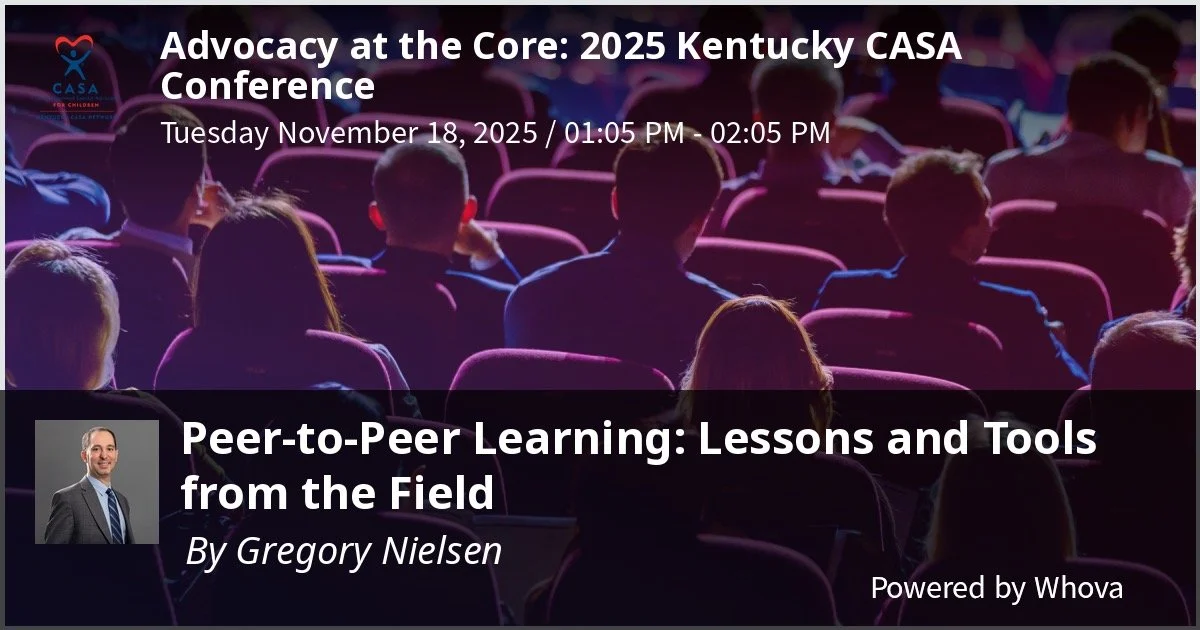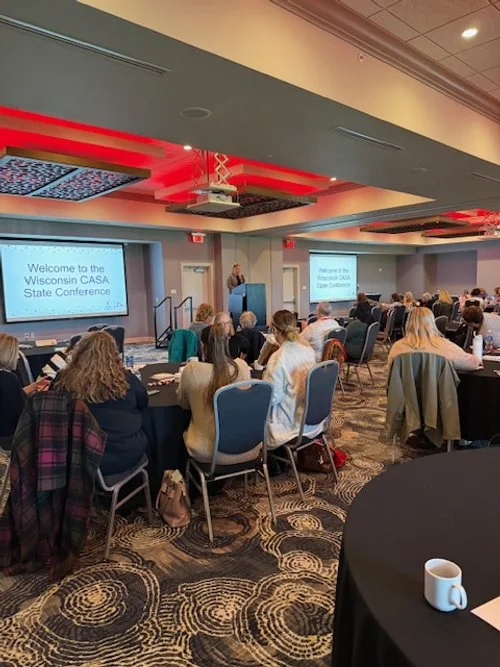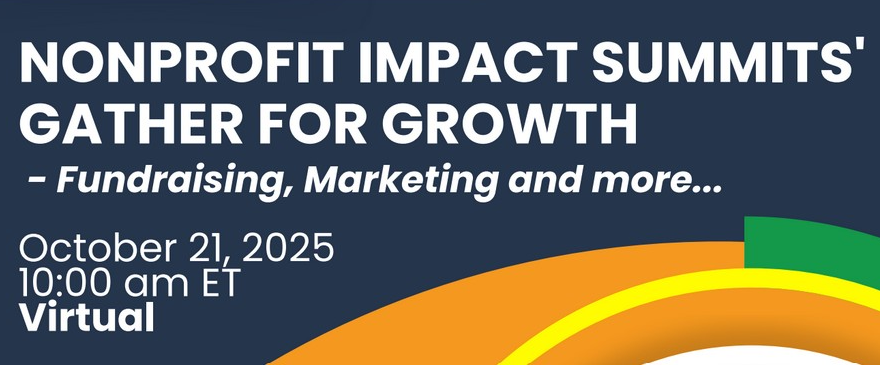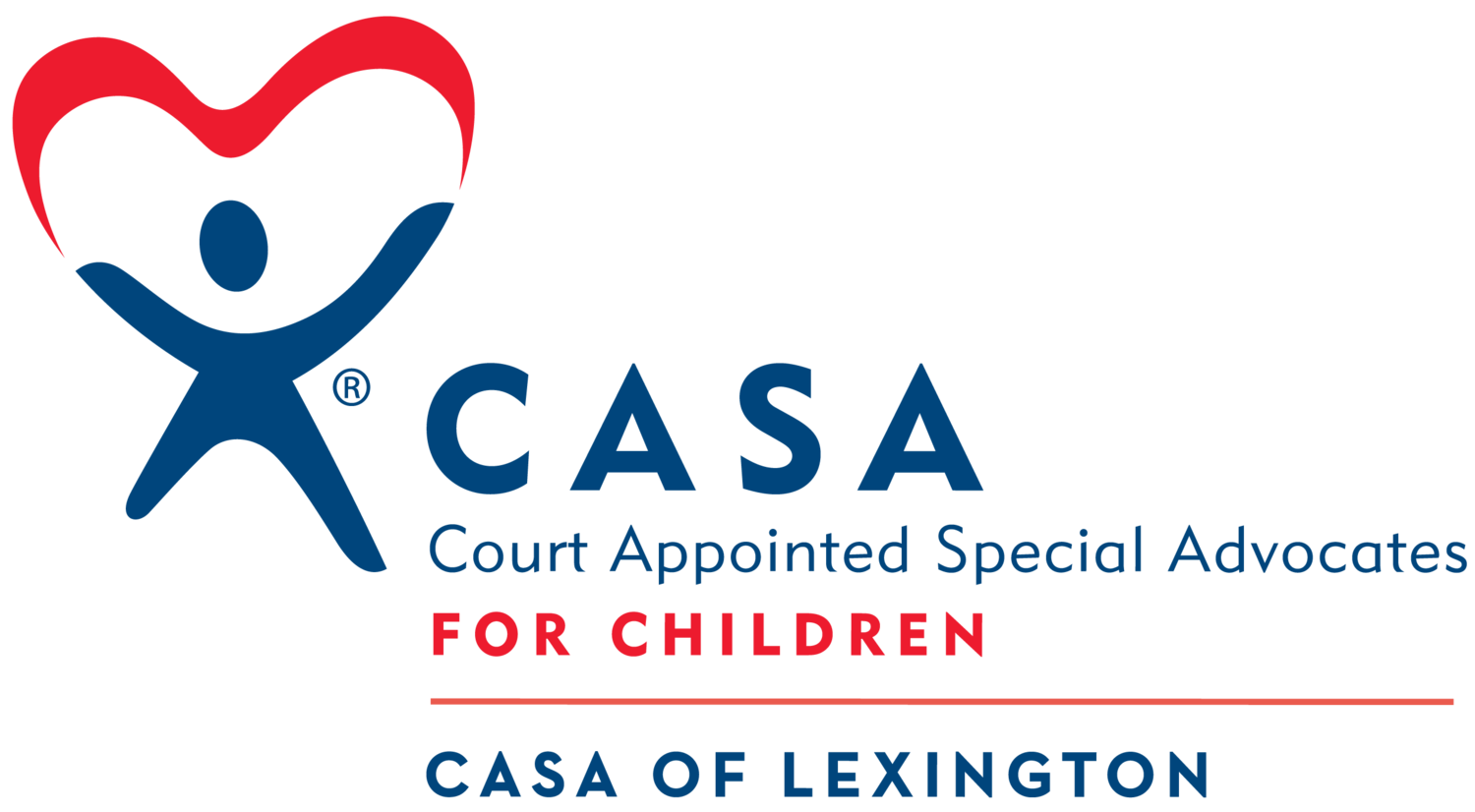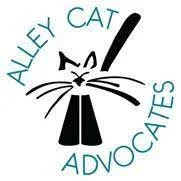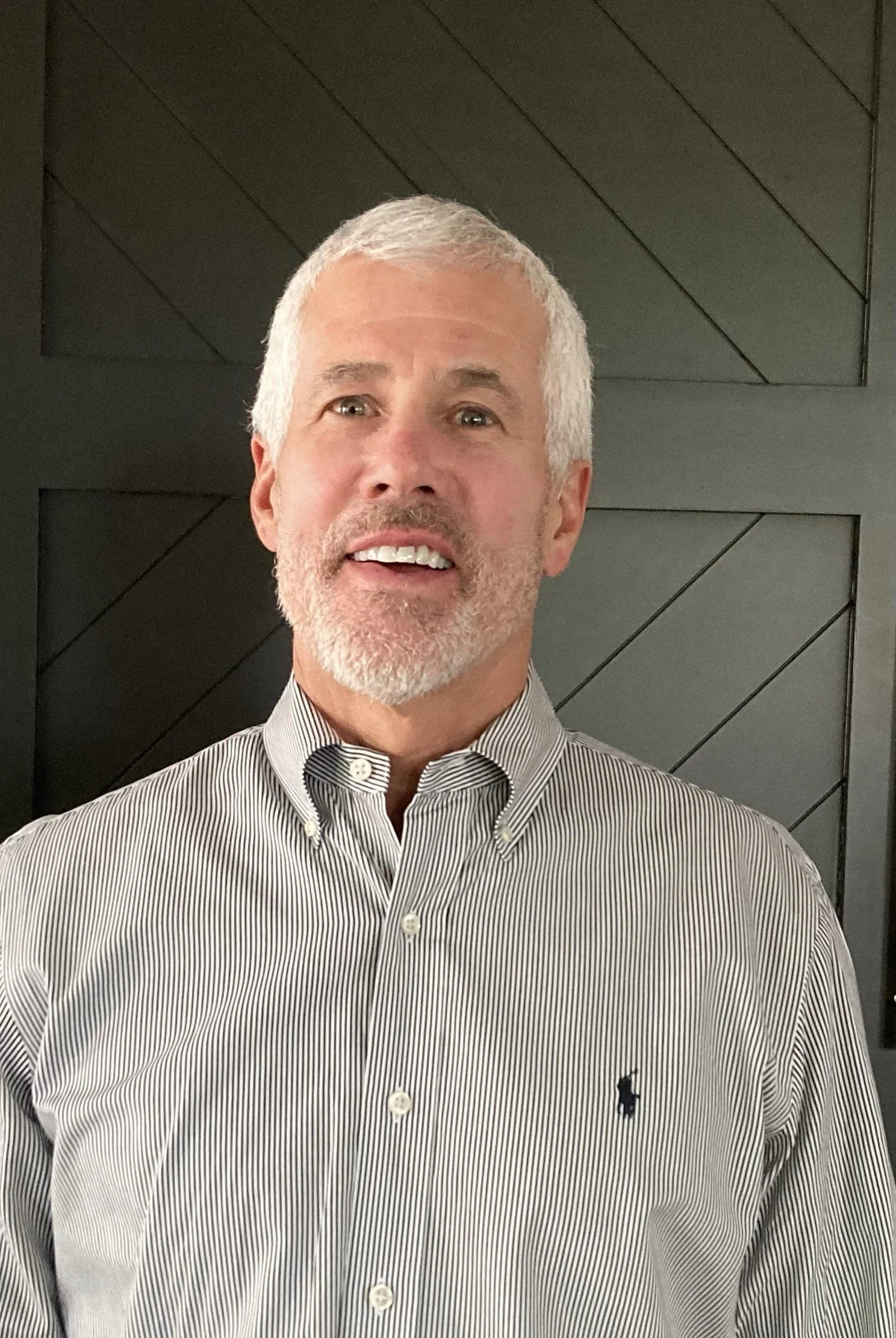
Latest News
NTCA RTIME 2026
Succession planning isn’t about replacing people.
It’s about protecting the mission.
Grateful to co-present multiple sessions at NTCA RTIME 2026 with Terry Chevalier for leaders across the rural broadband industry.
We explored two essential conversations:
🔹 Board succession is a governance system — not a last-minute discussion.
🔹 CEO succession must start with future strategy, not a name.
In rural telecommunications, the stakes are real: capital intensity, regulatory pressure, rapid technology shifts, and deep community reliance.
If a Board Chair or Executive stepped down tomorrow — would you be steady or scrambling?
Encouraged by the thoughtful engagement from NTCA leaders who are approaching succession with intentionality.
The baton will pass.
The question is whether it passes by design.
Mergers and Acquisitions in the Nonprofit Sector
Nonprofit mergers aren’t just legal transactions — they are mission decisions. When done well, they protect community impact, steward donor trust, and strengthen long-term sustainability. When done poorly, they can create distraction, drift, and unintended consequences.
Nonprofit mergers aren’t just legal transactions — they are mission decisions. When done well, they protect community impact, steward donor trust, and strengthen long-term sustainability. When done poorly, they can create distraction, drift, and unintended consequences.
I had the privilege of leading a session this week on Mergers & Acquisitions in the Nonprofit Sector for the South Carolina Bar Association.
We explored the governance considerations, fiduciary duties, cultural integration challenges, and the practical realities boards must navigate when consolidation becomes part of the strategy conversation.
My sincere thanks to the South Carolina Bar Association for the invitation and for convening such a thoughtful group of legal leaders.
And special appreciation to Ginny Waller for serving as an outstanding facilitator and fellow presenter — your leadership made the discussion both rigorous and engaging.
Grateful for the opportunity to contribute to the conversation at the intersection of law, governance, and mission.
Don’t Forget the Wisdom in the Room: Engaging Emeritus Board Members Thoughtfully
Most nonprofit leaders I know spend a lot of time thinking about who’s next—the next board member, the next committee chair, the next generation of leadership. That’s healthy. But sometimes, in the rush forward, organizations unintentionally leave behind a group that still has a great deal to offer: emeritus board members.
When engaged well, emeritus board members can be an extraordinary asset. When engaged poorly—or not defined at all—they can create confusion, frustration, and blurred lines of authority. Like most things in governance, the difference is intentionality.
So let’s talk about who emeritus board members are, why they matter, and what nonprofits should be careful about as they invite these seasoned leaders to stay connected.
What Is an Emeritus Board Member, Anyway?
An emeritus board member is typically a former board member who has completed their term of service but is invited to maintain a formal, ongoing relationship with the organization. Many nonprofits include a short provision in their bylaws authorizing the board to designate “Directors Emeritus” (or similar title). This status is usually honorary and non-voting .
Emeritus roles are often extended to individuals who have given long or particularly impactful service—founders, past chairs, major champions of the mission, or board members who played a critical role during a defining moment in the organization’s history.
What emeritus board members are not is “board members without term limits” or “shadow directors.” They are no longer part of the governing body, and that distinction matters.
The Value Emeritus Members Can Bring
When structured well, emeritus board members can add value in several meaningful ways.
First, they bring institutional memory. Nonprofits turn over leadership regularly, and that’s a good thing. But with turnover comes the risk of repeating old mistakes or forgetting hard-won lessons. Emeritus members often remember the “why” behind major decisions, the context of past partnerships, and the evolution of the mission over time.
Second, they can serve as trusted ambassadors. Emeritus members are often deeply connected in the community. They can open doors, make introductions, and advocate for the organization in spaces current board members may not yet reach. In fundraising, this can be especially powerful—particularly when an emeritus member is comfortable making thank-you calls, attending cultivation events, or lending credibility to a campaign.
Third, they can mentor current board and executive leaders. New board chairs and CEOs often benefit from a confidential sounding board—someone who understands the organization but is no longer in the hot seat. Emeritus members can provide perspective without politics if expectations are clear.
Finally, emeritus status can be a meaningful way to honor service. It communicates gratitude and respect, reinforcing a culture that values leadership, contribution, and long-term commitment to the mission.
Where Nonprofits Need to Be Careful
All of that upside comes with some important cautions.
The biggest risk is role confusion. If emeritus board members attend board meetings without clarity, weigh in on decisions, or communicate direction to staff, governance lines can blur quickly. Staff may not know whose guidance to follow. Board members may feel undermined. CEOs may feel like they have multiple bosses.
Another common pitfall is creating emeritus status without an exit ramp. Emeritus should not be automatic or indefinite by default. Not every departing board member needs—or wants—this role, and that’s okay. Organizations should be selective and clear about expectations, term length (if any), and purpose.
There’s also the risk of nostalgia overpowering strategy. Institutional memory is valuable, but it should inform forward-looking decisions—not anchor the organization to “the way we’ve always done it.” Emeritus members need to respect that the organization will evolve beyond their tenure.
Best Practices for Engaging Emeritus Board Members
Healthy engagement starts with clarity. Put the role in writing. Define whether emeritus members are voting or non-voting (they almost always should be non-voting), whether they attend board meetings, and how they are expected to contribute.
Give them meaningful, mission-aligned ways to stay involved—ambassadorship, mentoring, fundraising support, special projects—without inserting them into governance.
Finally, remember that emeritus status is a relationship, not a reward shelf. Like any relationship, it works best with communication, boundaries, and mutual respect.
When nonprofits engage emeritus board members thoughtfully, they don’t just honor the past—they strengthen the future. And in a sector built on relationships, wisdom doesn’t expire just because a term ends.
San Diego Botanic Garden
This week I had the privilege of facilitating focus groups with the dedicated staff and volunteers of the beautiful San Diego Botanic Garden as part of their strategic planning process.
One of the most important—and often most impactful—parts of thoughtful strategic planning is creating space to listen. Gathering input from a wide range of internal and external stakeholders brings forward perspectives that leadership alone can’t see, surfaces both opportunities and blind spots, and builds shared ownership in the path ahead. When people feel heard, plans become stronger, more grounded, and far more likely to succeed.
I’m grateful to the San Diego Botanic Garden team for their openness, insight, and deep commitment to mission as they think intentionally about the future.
CASA of the Ohio Valley Board Retreat
Grateful for the opportunity to spend time with the Board and leadership of CASA of the Ohio Valley during a strategy retreat focused on what matters most: children. Court Appointed Special Advocates play a critical role in giving vulnerable kids a voice when they need it most, and this team’s passion and purpose truly stood out. Their work is mission-critical, and it was a privilege to support their strategic focus on impact and sustainability.
Checking Boxes vs. Changing Outcomes: Goals for Nonprofit Leaders
Here’s something I notice every January without fail. The calendar flips, inboxes fill back up, and suddenly everyone is making lists. To-do lists. Priority lists. “Top 10 things we need to fix this year” lists. Board retreat agendas that are really just lists with headings. Individually and organizationally, lists feel productive. They give us the comforting sense that we are organized, attentive, and ready to take on what’s ahead.
But making lists is not the same thing as setting goals.
For nonprofit leaders and board members, that distinction matters more than we often admit. Lists are reactive. Goals are intentional.
Lists are typically born out of urgency. They capture what feels pressing, overdue, or slightly uncomfortable. We need lists to keep the wheels turning and to ensure nothing slips through the cracks. But lists tend to reflect the present moment—what’s noisy, what’s broken, what someone asked for last week. Goals, on the other hand, ask a different question entirely: Where are we trying to go, and why does it matter?
At the beginning of the calendar year, it’s common to see organizations arrive at their first board meeting with a long list of initiatives for the year ahead. Launch this program. Update that policy. Recruit more board members. Improve fundraising. Strengthen communications. None of these are wrong. In fact, most of them are probably necessary.
But without thoughtful goal-setting, lists quietly take over. And when lists run the show, nonprofit leaders end up busy without being aligned.
Setting goals requires pause, reflection, and discipline. It requires deciding what not to prioritize. That’s uncomfortable work, especially where the needs are real and the stakes feel high. Yet this is precisely why intentional goals are so valuable.
In strategic planning, goals serve as anchors. A strategic plan that is essentially a long list of activities is unlikely to guide decision-making when tradeoffs arise—as they always do. Clear goals help leaders and boards assess opportunities through a shared lens: Does this move us closer to what we said mattered most? Or is it simply another good idea competing for limited time and resources?
The same is true for board development. Many boards maintain a standing list of improvements they’d like to make—better meetings, stronger fundraising participation, more diversity of perspectives, clearer roles. Again, all worthy aspirations. But when boards set intentional goals around their own development, the conversation shifts. Instead of vaguely wanting to “be better,” the board commits to becoming more effective in specific, measurable ways that support the organization’s mission and stage of growth.
Intentional goals also change how we think about staff development. A list of trainings to attend or skills to acquire can be helpful, but it doesn’t replace a goal-driven approach to growth. When leaders take the time to set thoughtful development goals with staff, they send a powerful message: development isn’t about checking boxes; it’s about preparing people to contribute meaningfully to where the organization is headed.
And then there’s individual professional development—perhaps the easiest place to default to lists. Books to read. Conferences to attend. Certifications to consider. Without goals, these lists can become a form of procrastination disguised as growth. With goals, professional development becomes intentional, focused, and aligned with both personal aspirations and organizational needs.
Goals create shared accountability.
When a board or leadership team sets goals together, they create a common reference point for progress, learning, and course correction. That shared ownership is difficult to achieve when everyone is simply working through their own list.
As the year gets underway, it’s worth asking a few simple but powerful questions—individually, as leadership teams, and as boards. Are we clear about what success looks like this year? Have we articulated goals that reflect our values, our strategy, and our capacity? Or are we simply hoping that checking enough items off the list will add up to meaningful progress?
Intentional goals don’t eliminate complexity or constraint. They don’t make nonprofit leadership easier. But they do make it clearer. And clarity is one of the most valuable resources we have.
Welcoming Mackenzee McKittrick as Alley Cat Advocates’ next Executive Director
After a thoughtful and comprehensive executive search facilitated by Nielsen Training and Consulting, the Alley Cat Advocates Board of Directors is thrilled to announce the selection of Mackenzee McKittrick as its next Executive Director.
Mackenzee begins her tenure in this role on February 16, 2026. She will succeed Alley Cat Advocates’ visionary co-founder and Executive Director Karen Little who is retiring.
Mackenzee brings nearly 13 years of feline-focused animal welfare experience, including hands-on leadership in community cat programming and municipal policy development. She most recently served as Event and Outreach Coordinator at Vanderburgh Humane Society, in Evansville, Indiana, where she led the Community Cat Program and achieved significant, measurable results, including:
A 32% decrease in cat euthanasia at local Animal Control
231 fewer cat intakes at the Humane Society compared to the prior year
Her expertise in community partnerships, program development, and fundraising has made a lasting impact on the lives of countless cats and the communities she serves.
Leadership Quotes:
“I'm very excited about the experience, energy, and passion Mackenzee will bring to Alley Cat Advocates as our new Executive Director. The Board and I are all committed to partnering closely with her during the transition and cannot wait to see how the organization will grow under her leadership.”
Aaron Jessie, Board Chair
“I could not be more pleased to have Mackenzee McKittrick accept the position of Alley Cat Advocates' new Executive Director. She brings both a passion for the mission and a strong set of skills, the combination of which will help Alley Cat Advocates thrive for many years to come,”
Karen Little, Alley Cat Advocates’ retiring Executive Director
“It is a great privilege to step into the role of executive director of Alley Cat Advocates. After years of following ACA as a leader in community cat programming, I am excited to apply my skills and passion to continue making Louisville the safest city in the country for community cats. Alley Cat Advocates has been a cornerstone for gold standard care of unowned cats, and I am thrilled to continue Karen's legacy.”
Mackenzee McKittrick, Incoming Executive Director
Please join us in welcoming Mackenzee to her new role!
Board Transitions Done Well
Board transitions are one of the most overlooked—and most important—moments in a nonprofit’s life. Whether you are welcoming new board members or saying goodbye to longtime leaders, how you manage these transitions sends a powerful signal about your culture, your governance maturity, and your respect for volunteer leadership.
The good news? With a little intention, board transitions can strengthen—not disrupt—your organization.
Bringing New Board Members On: Start with Clarity, Not Paperwork
Too many nonprofits confuse “orientation” with handing someone a thick binder and hoping for the best. Effective onboarding is less about information overload and more about context, relationships, and expectations.
New board members should quickly understand three things: why the organization exists, how the board adds value, and what is expected of them individually. That means going beyond bylaws and financials. Pair new members with a board mentor. Schedule time with the board chair and executive director. Explain how decisions actually get made—not just how they’re supposed to. The Board team is led and managed by Board leaders and these leaders should take an active role in structuring the onboarding process of their new teammates.
Just as important, create space for new voices early. Ask new members what drew them to the organization and what perspective they bring. When people feel heard from the start, they engage more fully and faster.
Supporting Early Success: The First Year Matters
The first year of board service often determines whether a member becomes deeply engaged or quietly disengaged. Smart boards set clear expectations around attendance, committee service, fundraising, and ambassadorship—and then reinforce those expectations through regular check-ins and accountability.
Annual goals for board members, even informal ones, can be incredibly helpful. So can brief, periodic evaluations that focus on learning and improvement rather than compliance. Remember, good governance is a team sport.
Transitioning Board Members Off: End Well, Not Abruptly
Board service should end as thoughtfully as it begins. Too often, board members rotate off with little acknowledgment, minimal reflection, and no structured handoff. That’s a missed opportunity.
A strong offboarding process includes a few key elements: gratitude, knowledge transfer, and continued connection. Thank departing members publicly and specifically for their contributions. Invite them to share insights about what worked, what didn’t, and what the board should pay attention to next.
Some organizations conduct brief exit conversations or surveys. Others invite outgoing members to remain involved as ambassadors, advisors, or donors. Ending well preserves relationships and reinforces a culture of respect.
Why It All Matters
Board transitions aren’t administrative tasks—they’re governance moments. They shape how power is shared, how trust is built, and how leadership evolves. When nonprofits handle transitions with care, they send a clear message: this organization values people, plans ahead, and takes stewardship seriously.
And in a sector built on mission and trust, that message matters more than ever.
Kentucky CASA Network Conference
Huge thanks to the Kentucky CASA Network for the work you do every day for children and families across the Commonwealth. Yesterday’s conference was energizing and inspiring and I enjoyed leading sessions on “Peer to Peer Learning: Lessons from the Field” and “Artificial Intelligence and Board Governance.” CASA volunteers change lives, and I highly encourage you to learn more about CASA programs near you.
#Nonprofit #Nonprofits #CASA #Speaker #Facilitator
BoardBuild Board Retreat
Enjoyed an energizing and impactful Board retreat with BoardBuild last week.
BoardBuild strengthens communities through the certification and matching of leaders with qualified nonprofit boards. BoardBuild equips individuals with the skills and knowledge they need to govern effectively — and helps organizations build stronger, more diverse, and more capable boards.
Grateful for the thoughtful conversations, the shared commitment, and the inspiring vision this board brings to the table.
Here’s to building stronger leaders and stronger communities.
#Nonprofit #Nonprofits #BoardBuild #BoardGovernance #Leadership #Community
Executive Search: Woody Williams Foundation - President and CEO
I am pleased to share an exciting leadership opportunity with the Woody Williams Foundation, a national organization dedicated to honoring, recognizing, and serving Gold Star Families and the legacy of their Loved Ones who made the ultimate sacrifice.
The Foundation is seeking a President & Chief Executive Officer to serve as its next leader. This individual will serve as the chief ambassador of the organization—advancing its mission, leading strategic growth and fundraising, and ensuring the sustainability of its programs that carry forward the vision of Hershel “Woody” Williams.
The Foundation is seeking a mission-driven, results-oriented leader who can strengthen operations, build relationships with stakeholders, and position the organization for long-term success.
I invite you to review the full position announcement.
If you or someone in your network might be a strong fit for this meaningful opportunity, please encourage them to submit a resume and cover letter to gregory@nielsenconsults.com. Applications will be reviewed on a rolling basis until the position is filled.
Thank you for helping us share this important opportunity to honor and serve Gold Star Families.
CASA Wisconsin Conference
Had a great time speaking at the annual CASA Wisconsin Conference. It was a privilege to lead a session entitled “Rowing Together: Board and Executive Director Partnerships” — exploring how strong collaboration and shared purpose between boards and executives drive mission impact.
Grateful for the inspiring work CASA programs do every day to advocate for children and families across Wisconsin, and for the thoughtful engagement of all who joined the discussion! 🚣♂️💙
#NonprofitLeadership #BoardGovernance #CASAWisconsin #LeadershipDevelopment #GregoryNielsen #NonprofitExcellence #CASA #Nonprofit #Nonprofits #Facilitator #Facilitation #ConferenceSpeaker
Board Champions 201 in Evansville
Excited to be in Evansville, Indiana yesterday facilitating Board Champions 201 with an incredible group of nonprofit leaders and board members!
This session builds on the foundations of strong governance and explores how boards can elevate their impact through strategic leadership, partnership, and accountability.
A heartfelt thank-you to the Welborn Baptist Foundation for their generosity and partnership in making this learning opportunity possible. Their commitment to strengthening nonprofit leadership in the region is truly inspiring.
#NonprofitLeadership #BoardGovernance #BoardDevelopment #Evansville #WelbornBaptistFoundation #LeadershipDevelopment
Finding the Right Leader: A Thoughtful Approach to Executive Search
Hiring a new CEO or Executive Director is one of the most important decisions a board will ever make. The right leader can help your organization flourish, while the wrong fit can set you back significantly. That’s why a structured, intentional process matters so much in executive search.
Too often, boards want to jump straight to looking at résumés. But the truth is, success starts well before candidates enter the picture. A strong search process isn’t just about finding a person—it’s about aligning leadership needs, organizational culture, and future vision. Our proven three-phase approach is based on the model developed by Gary Romano in Lean Recruitment: Finding Better Talent Faster -- a model that has been used worldwide.
Phase 1: DEFINE – Establishing the Foundation
Every successful search begins with clarity. Before you even write a job description, the board needs to step back and ask: What kind of leader do we need for where we are—and where we’re going?
This stage is all about building that foundation. The search committee meets with key stakeholders—board members, staff, community partners—to really understand organizational goals and leadership competencies. From these conversations comes a Position Announcement: a clear picture of the qualifications, skills, and characteristics you’re seeking in the next leader.
Equally important is developing a candidate scorecard. This tool allows the search committee to evaluate applicants consistently and fairly, avoiding bias and ensuring everyone is measured against the same criteria.
Another critical step is transparency. A search process only works when everyone knows their role and how communication will flow. Establishing a timeline, roles, and protocols at the beginning creates trust and reduces confusion. Boards also need to think carefully about the role of the outgoing executive—how and when they’ll be involved, and how to manage the transition respectfully.
Finally, don’t underestimate communication. Creating a plan to keep staff, board, and key partners appropriately informed avoids rumors and builds confidence in the process.
By the end of this phase, you have more than a job posting—you have a roadmap for a successful search.
Phase 2: DISCOVER – Sourcing and Screening Talent
Once the foundation is set, the real search begins. But here’s the key: don’t just wait for résumés to roll in. The best nonprofit leaders often aren’t actively job-hunting, so sourcing requires intentional outreach. That might mean tapping networks, connecting with affinity groups to ensure diversity, and working with your staff and board to identify promising candidates.
Structured interviews are a big part of this phase. Rather than each committee member “winging it,” a candidate interview guide helps ensure that every applicant is asked consistent, mission-aligned questions. This not only creates a fairer process but also makes it easier to compare candidates.
As the pool narrows, the search committee receives a shortlist of finalists, complete with summarized assessments. At this point, reference checks, academic verification, and even a scan of social media presence help confirm that what you see on paper matches reality.
This phase is where the committee starts to see real possibilities—and where the groundwork from Phase 1 pays off. Because you already know what you’re looking for, you can better recognize it when you see it.
Phase 3: DECIDE – Selecting and Supporting the New CEO
The final stage is about more than making a decision—it’s about making the right decision and setting your new leader up for success.
The board’s role is to weigh the evidence, conduct thoughtful finalist interviews, and ultimately come to consensus on the candidate who best aligns with the leadership profile and organizational vision. This isn’t just about who looks good on paper—it’s about who fits your culture and can help carry your mission forward.
Once the offer is made, the search doesn’t end. Supporting the transition is just as important as the hiring decision. A thoughtful onboarding plan, clarity around board-staff roles, and regular check-ins during the first year all help ensure your new executive feels supported and can hit the ground running.
Why We Rely on This Approach
By taking the time to define, discover, and decide, boards not only find the right leader but also build confidence among staff, stakeholders, and the community.
Hiring a nonprofit CEO is about more than filling a position. It’s about choosing the person who will inspire, guide, and steward your mission into the future. And that deserves nothing less than a thoughtful, intentional process.
Nonprofit Impact Summits: Gather for Growth
One of the most valuable things we can do as nonprofit leaders is to share what we’ve learned, our wins, our struggles, and the strategies that help us move forward. That’s why I’m honored to be part of the Nonprofit Impact Summits: Gather for Growth, where I’ll be presenting a session on Leading Through Uncertainty: Scenario Planning.
This summit gathers 70+ speakers who are passionate about strengthening the sector. From fundraising and marketing to leadership and operations, every session is designed to help organizations build capacity and drive greater impact.
If you’ve been looking for fresh ideas, inspiration, and practical tools to take your nonprofit to the next level, this is the place to be.
Join me HERE.
I’d love to see you in my session and hear how you’re creating change in your community.
#NonprofitImpact #Nonprofit #Nonprofits #Facilitator #Facilitation #ConferenceSpeaker #NonprofitLeadership #CapacityBuilding #Changemakers
Maryland Nonprofits Conference 2025
🌟 Excited to share that I presented “Weathering the What-Ifs: Scenario Planning for Resilience” at the Maryland Nonprofits Conference!
Scenario planning is a vital tool for nonprofits, helping organizations anticipate challenges, make informed decisions, and strengthen long-term resilience. 💡
CASA of Lexington Board Retreat
Honored to facilitate a Board retreat with the dedicated Board of Directors of CASA of Lexington. Grateful for their commitment to advocating for children and strengthening the organization’s impact in the community. Inspiring to see leaders come together with such passion and purpose! 💙
📢 Alley Cat Advocates Seeking Its Next Executive Director
Nielsen Training and Consulting is honored to partner with Alley Cat Advocates (ACA) in the search for its next Executive Director.
Since 1999, ACA has been led by its visionary co-founder and nationally recognized leader Karen Little. ACA is a trusted leader in the humane treatment of unowned cats through its nationally recognized Trap-Neuter-Return program.
The Board of Directors has launched a thoughtful and inclusive process to identify the organization’s next leader. The Executive Director will serve as the chief executive of ACA, reporting to the Board of Directors and leading a talented staff team. This is an opportunity to partner with a dedicated board, volunteers, donors, and community stakeholders to advance ACA’s mission and ensure its long-term sustainability.
During this transition, ACA remains strong, stable, and mission-focused—continuing to serve thousands of cats and community members each year with compassion and innovation. This moment presents an exciting opportunity for a new leader to honor ACA’s legacy while guiding it toward future growth and expanded impact.
The search will attract outstanding candidates who share ACA’s vision and values, bringing energy and leadership to this remarkable organization. You may view the full Executive Director Position Announcement for details about the role, desired qualifications, and application instructions.
Interested candidates should submit a cover letter and resume to gregory@nielsenconsults.com. Applications will be reviewed on a rolling basis, with preference given to submissions received by October 31, 2025.
I invite you to partner with us by sharing the linked position announcement with your networks. Your help spreading the word will ensure that we reach outstanding candidates excited to build on the success of Alley Cat Advocates.
Join Me at the Maryland Nonprofits Conference October 9
I’m thrilled to share that I’ll be speaking at the Maryland Nonprofits 2025 Annual Conference, “Facing the Future Together,” on October 8 and 9, hosted in collaboration with the Comptroller of Maryland.
Join me for my session: Weathering the What-Ifs: Scenario Planning for Resilience
Register for #MANOAC25 using the link below and be sure to use the link FRIEND10 to receive 10% off your conference registration.
Welcoming Dave Neumann to the NTC Team
We are delighted to announce that Dave Neumann is joining the NTC team as an Organizational Development Consultant. Dave has been a friend and trusted colleague for years and his passion for helping leaders and organizations thrive aligns with our mission.
Dave brings over 40 years of experience helping organizations achieve breakthrough results in both for-profit and nonprofit sectors. He holds a PhD in Industrial & Organizational Psychology and built a distinguished career in HR and OD leadership, including 22 years with PepsiCo and Yum Brands. There, he served as Vice President of Organization Development and as Chief Human Resources Officer for KFC, Long John Silver’s, and A&W Restaurants.
Since 2012, Dave has advised national and regional organizations in healthcare, manufacturing, and the nonprofit sector, with expertise in:
Organization Alignment – Connecting strategy, structure, resources, and culture for maximum impact.
Culture Development – Designing and embedding high-impact organizational values.
Organizational Effectiveness & Change – Improving executive performance, team alignment, employee engagement, and change readiness.
Human Resources Strategy – Guiding performance management, succession planning, and leadership development.
In Dave’s own words:
“I’m thrilled to be joining Nielsen Training & Consulting as an Organizational Development consultant. Having worked with Greg for many years, I know his deep competence, integrity, and gift for helping organizations and their boards to thrive. With over 40 years of experience in both for-profit and nonprofit organizations, I specialize in creating organizational effectiveness, aligning strategy, structure, and culture, strategic planning, teambuilding, and leadership development coaching. I’m excited to partner with Greg to help organizations achieve their mission, engage their staff, and make a lasting impact in the communities they serve.”
A client’s perspective:
As Executive Director of Dare to Care Food Bank, one of my first decisions was to engage Dave to develop a new strategic plan, as well as create and institute a new organizational structure and performance review process. Dave took complete ownership of the process, working closely with me, key staff, board members and stakeholders to accomplish this work in both a timely and professional manner. That strategic plan and org/performance review process set Dare to Care on an amazing growth arc for over a decade.
Brian Riendeau, Executive Director Dare to Care, Retired
“I had the privilege of working with Dave to develop our organizational values and design an experiential training to cascade them across the company. His ability to translate our vision into an engaging, hands-on experience was remarkable, and over a year later, we’re still living these values every day. His insight, creativity, and passion left a lasting mark on our culture.”
Kila Sweeney, Chief People Officer, Ovation Healthcare
"I’ve had the privilege of working with Dave Neumann at two different companies, each time bringing him in to help us navigate culture transformation. Dave’s process is thoughtful, his analysis is spot-on, and his wisdom runs deep. His experience working with executive leadership was instrumental in helping us gain full buy-in from our leadership teams, ensuring our culture strategy had the support it needed from the top down. Dave has a way of turning “culture” from a concept into something real and actionable, which helped us roll it out in a way that truly connected with our people and made a measurable impact on engagement. On top of all that, Dave is just fantastic to work with—kind, collaborative, and one of the most impressive humans you’ll ever meet."
Dr, Jennifer Platt, VP Organizational & People Development, Lifepoint Health
Please join us in welcoming Dave to the NTC team. We’re excited about the expertise, insight, and passion he brings to our clients and the communities they serve. Whether your needs involve strategy, governance, or organizational development, you can explore how partnering with NTC can elevate your team by clicking the link below to learn more.

